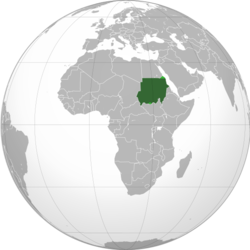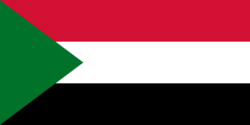Difference between revisions of "Sudan"
(Update) |
|||
| Line 9: | Line 9: | ||
'''Sudan''' was on a list of seven countries which retired 4-star general [[Wesley Clark]] (former [[supreme commander of NATO forces in Europe]] 1997-2001) stated the US military had plans to invade: | '''Sudan''' was on a list of seven countries which retired 4-star general [[Wesley Clark]] (former [[supreme commander of NATO forces in Europe]] 1997-2001) stated the US military had plans to invade: | ||
{{QB| | {{QB| | ||
| − | In 2001, in the Pentagon, a general told me : | + | In 2001, in the [[Pentagon]], a general told me : "I just received a classified memo from the [[Secretary of Defense]]: we will take seven countries in five years, starting with [[Iraq]], then [[Syria]], [[Lebanon]], [[Libya]], [[Somalia]], [[Sudan]] and finally, [[Iran]]."<ref>Interview radio Democracy Now, 2007-03-02</ref> |
}} | }} | ||
| − | |||
| − | |||
| + | ==Conflict and partition== | ||
| + | The Sudanese conflict in South Kordofan and Blue Nile in the early 2010s between [[Sudan People's Armed Forces|the Army of Sudan]] and the [[Sudan Revolutionary Front]] started as a dispute over the oil-rich region of [[Abyei]] in the months leading up to [[South Sudan|South Sudanese independence]] in 2011, though it is also related to civil war in [[Darfur]] that is nominally resolved. The events would later be known as the [[Sudanese Intifada]], which would end only in 2013 after [[President of Sudan|Sudanese President]] [[Omar al-Bashir]] promised he would not seek re-election in 2015. He later broke his promise and sought re-election in 2015, winning through a boycott from the opposition who believed that the elections would not be free and fair. Voter turnout was at a low 46%.<ref>''[https://www.bbc.co.uk/news/world-africa-32481013 "Omar al-Bashir wins Sudan elections by a landslide"]''</ref> | ||
| + | |||
| + | On 13 January 2017, US president [[Barack Obama]], signed an Executive Order that lifted many sanctions placed against Sudan and assets of its government held abroad. On 6 October 2017, the following US president [[Donald Trump]] lifted most of the remaining sanctions against the country and its petroleum, export-import, and property industries.<ref>''[https://www.bloomberg.com/news/articles/2017-10-06/u-s-lifting-most-sudan-sanctions-on-progress-in-terrorism-fight "Trump Moves to Lift Most Sudan Sanctions"]''</ref> | ||
| + | |||
| + | On 19 December 2018, massive protests began after a government decision to triple the price of goods at a time when the country was suffering an acute shortage of foreign currency and inflation of 70 percent.<ref>''[https://www.cmi.no/news/2116-sudan-december-2018-riots-is-the-regime-crumbling "Sudan December 2018 riots: Is the regime crumbling?"]''</ref> In addition, President al-Bashir, who had been in power for more than 30 years, refused to step down, resulting in the convergence of opposition groups to form a united coalition. The government retaliated by arresting more than 800 opposition figures and protesters, leading to the death of approximately 40 people according to the [[Human Rights Watch]].<ref>''[https://www.hrw.org/news/2019/04/09/sudan-protesters-killed-injured "Sudan: Protesters Killed, Injured"]''</ref> The protests have continued since the overthrow of his government on 11 April 2019, when President al-Bashir was arrested and a three-month state of emergency was enacted.<ref>''[https://www.bbc.com/news/world-africa-47891470 "Sudan military coup topples Bashir"]''</ref><ref>''[https://www.aljazeera.com/news/2019/01/sudan-crowds-rally-bashir-police-tear-gas-rival-protest-190109115845545.html "Sudan's Omar al-Bashir vows to stay in power as protests rage"]''</ref><ref>[https://www.aljazeera.com/news/2019/01/future-unclear-sudan-protesters-president-loggerheads-190108135021310.html "Future unclear as Sudan protesters and president at loggerheads"]</ref> Over 100 people died in early June in clashes between pro-democracy protesters and state security forces, resulting in Sudan's suspension from the [[African Union]].<ref>''[https://www.theguardian.com/world/video/2019/jun/06/aftermath-of-sudan-crackdown-emerges-as-death-toll-passes-100-video "African Union suspends Sudan over violence against protestors – video"]''</ref> Sudan's youth has been reported to be driving the protests.<ref>''[https://www.bbc.com/news/av/world-africa-48802235/sudan-dying-for-the-revolution "They'll have to kill all of us!"]''</ref> | ||
| + | {{SMWDocs}} | ||
==References== | ==References== | ||
{{reflist}} | {{reflist}} | ||
Revision as of 14:07, 6 August 2019
 | |
 | |
| Location | Africa |
| Leader | Sudan/President |
| Type | nation state |
| Interest of | George Clooney, Sudan/2021 coup d'état |
| Member of | Arab League, Organisation of African Unity, UN |
| Subpage | •Sudan/2021 coup d'état •Sudan/Finance minister •Sudan/President |
Sudan was on a list of seven countries which retired 4-star general Wesley Clark (former supreme commander of NATO forces in Europe 1997-2001) stated the US military had plans to invade:
In 2001, in the Pentagon, a general told me : "I just received a classified memo from the Secretary of Defense: we will take seven countries in five years, starting with Iraq, then Syria, Lebanon, Libya, Somalia, Sudan and finally, Iran."[1]
Contents
Conflict and partition
The Sudanese conflict in South Kordofan and Blue Nile in the early 2010s between the Army of Sudan and the Sudan Revolutionary Front started as a dispute over the oil-rich region of Abyei in the months leading up to South Sudanese independence in 2011, though it is also related to civil war in Darfur that is nominally resolved. The events would later be known as the Sudanese Intifada, which would end only in 2013 after Sudanese President Omar al-Bashir promised he would not seek re-election in 2015. He later broke his promise and sought re-election in 2015, winning through a boycott from the opposition who believed that the elections would not be free and fair. Voter turnout was at a low 46%.[2]
On 13 January 2017, US president Barack Obama, signed an Executive Order that lifted many sanctions placed against Sudan and assets of its government held abroad. On 6 October 2017, the following US president Donald Trump lifted most of the remaining sanctions against the country and its petroleum, export-import, and property industries.[3]
On 19 December 2018, massive protests began after a government decision to triple the price of goods at a time when the country was suffering an acute shortage of foreign currency and inflation of 70 percent.[4] In addition, President al-Bashir, who had been in power for more than 30 years, refused to step down, resulting in the convergence of opposition groups to form a united coalition. The government retaliated by arresting more than 800 opposition figures and protesters, leading to the death of approximately 40 people according to the Human Rights Watch.[5] The protests have continued since the overthrow of his government on 11 April 2019, when President al-Bashir was arrested and a three-month state of emergency was enacted.[6][7][8] Over 100 people died in early June in clashes between pro-democracy protesters and state security forces, resulting in Sudan's suspension from the African Union.[9] Sudan's youth has been reported to be driving the protests.[10]
Related Quotation
| Page | Quote | Author | Date |
|---|---|---|---|
| Wesley Clark | “In 2001, in the Pentagon, a general told me : ‘I just received a classified memo from the Secretary of Defense: we will take seven countries in five years, starting with Iraq, then Syria, Lebanon, Libya, Somalia, Sudan and finally, Iran.’” | Wesley Clark | 2 March 2007 |
Event Participated in
| Event | Start | End | Location(s) | Description |
|---|---|---|---|---|
| Bandung Conference | 1955 | 1955 | Indonesia | Important conference for the global south; participants soon became prime targets for US foreign policy |
Related Document
| Title | Type | Publication date | Author(s) | Description |
|---|---|---|---|---|
| Document:A Brief History of the CIA’s Dirty War in South Sudan | Article | 31 July 2019 | Ryan Dawson | The CIA are now almost completely out of the picture in South Sudan though one should never underestimate the Agency’s capacity for evil. It's in the US national interest to deny China access to African oil so it will always continue to be US vs China in South Sudan, as part of Pax Americana’s designs for Africa as a whole. |
References
- ↑ Interview radio Democracy Now, 2007-03-02
- ↑ "Omar al-Bashir wins Sudan elections by a landslide"
- ↑ "Trump Moves to Lift Most Sudan Sanctions"
- ↑ "Sudan December 2018 riots: Is the regime crumbling?"
- ↑ "Sudan: Protesters Killed, Injured"
- ↑ "Sudan military coup topples Bashir"
- ↑ "Sudan's Omar al-Bashir vows to stay in power as protests rage"
- ↑ "Future unclear as Sudan protesters and president at loggerheads"
- ↑ "African Union suspends Sudan over violence against protestors – video"
- ↑ "They'll have to kill all of us!"